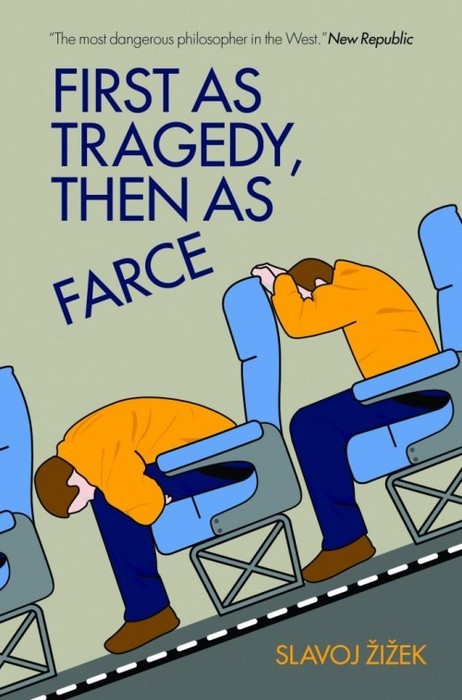Slavoj Zizek: First As Tragedy, Then As Farce (2009)
Filed under book | Tags: · capitalism, commons, communism, globalisation, propaganda, socialism

From the tragedy of 9/11 to the farce of the financial meltdown
In this bravura analysis of the current global crisis following on from his bestselling Welcome to the Desert of the Real, Slavoj Zizek argues that the liberal idea of the “end of history,” declared by Francis Fukuyama during the 1990s, has had to die twice. After the collapse of the liberal-democratic political utopia, on the morning of 9/11, came the collapse of the economic utopia of global market capitalism at the end of 2008.
Marx argued that history repeats itself “occuring first as tragedy, the second time as farce” and Zizek, following Herbert Marcuse, notes here that the repetition as farce can be even more terrifying than the original tragedy. The financial meltdown signals that the fantasy of globalization is over and as millions are put out of work it has become impossible to ignore the irrationality of global capitalism. Just a few months before the crash, the world’s priorities seemed to be global warming, AIDS, and access to medicine, food and water — tasks labelled as urgent, but with any real action repeatedly postponed.
Now, after the financial implosion, the urgent need to act seems to have become unconditional — with the result that undreamt of quantities of cash were immediately found and then poured into the financial sector without any regard for the old priorities. Do we need further proof, Zizek asks, that Capital is the Real of our lives: the Real whose demands are more absolute than even the most pressing problems of our natural and social world?
Publisher Verso, 2009
ISBN 1844674282, 9781844674282
Length 96 pages
PDF (updated on 2012-4-15)
Comment (0)Michael Hardt, Antonio Negri: Commonwealth (2009) [English/German]
Filed under book | Tags: · activism, commons, globalisation, governance, politics, revolution

When Empire appeared in 2000, it defined the political and economic challenges of the era of globalization and, thrillingly, found in them possibilities for new and more democratic forms of social organization. Now, with Commonwealth, Michael Hardt and Antonio Negri conclude the trilogy begun with Empire and continued in Multitude, proposing an ethics of freedom for living in our common world and articulating a possible constitution for our common wealth.
Drawing on scenarios from around the globe and elucidating the themes that unite them, Hardt and Negri focus on the logic of institutions and the models of governance adequate to our understanding of a global commonwealth. They argue for the idea of the “common” to replace the opposition of private and public and the politics predicated on that opposition. Ultimately, they articulate the theoretical bases for what they call “governing the revolution.”
Though this book functions as an extension and a completion of a sustained line of Hardt and Negri’s thought, it also stands alone and is entirely accessible to readers who are not familiar with the previous works. It is certain to appeal to, challenge, and enrich the thinking of anyone interested in questions of politics and globalization.
Publisher Harvard University Press, 2009
ISBN 0674035119, 9780674035119
330 pages
PDF [English] (updated on 2012-7-27)
PDF [German] (added on 2012-7-27)
Frank Webster: Theories of the Information Society, 3rd ed. (2006)
Filed under book | Tags: · globalisation, information society, internet, postmodernism, social theory, theory
Coping in an era of information flows, of virtual relationships and breakneck change poses challenges to one and all.
In Theories of the Information Society Frank Webster makes sense of the information explosion, taking a sceptical look at what thinkers mean when they refer to the ‘Information Society’ and critically examines the major post-war theories and approaches to informational development. This third edition brings the book right up to date with both new theoretical work and, social and technological changes (such as the rapid growth of the Internet and accelerated globalization), reassessing the work of key theorists in light of these changes.
This book is essential reading for students of contemporary social theory and anybody interested in social and technological change in the post-war era. It addresses issues of central concern to students of sociology, politics, communications, information science, cultural studies, computing and librarianship.
Edition: 3
Published by: Routledge, 2006
ISBN: 978-0-415-40633-8
Pages: 312
More info (publisher)
More info (google books)

